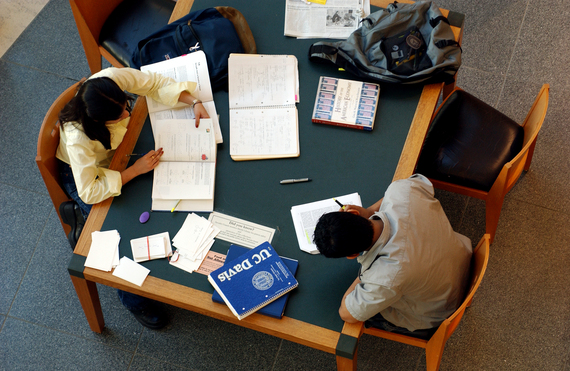Access to Higher Education
Equals Access to Opportunity
Linda Katehi, Chancellor, UC Davis
College rankings are something parents, students and educators all watch. They offer a snapshot of what each university has to offer and UC Davis has long enjoyed high rankings across the board.
UC Davis has been recognized for being 1st in the world for agriculture and forestry each of the past three years by QS World University, 1st among the world's veterinary schools also by QS World University and just this past week was ranked 44th in the world among all universities by Times Higher Education of London. But there was one recent ranking that filled me with even more pride because it says so much about who we are and what we value at UC Davis. The New York Times, in an article headlined "California's Upward Mobility Machine," ranked us number two in the nation when it comes to educating students of diverse economic backgrounds.
We provide a world-class education at UC Davis. As Chancellor, I know our faculty and staff work incredibly hard to offer outstanding programs and opportunities for our students. But the overriding issue for me as leader of a public higher education institution is being able to ensure access and affordability as we also maintain institutional excellence. A quality college education can be transformative. I could not be more proud of UC Davis and our sister campuses in the UC system for our devotion to access for students of varying socio-economic backgrounds.
The Times survey put six UC campuses among the top seven for doing the most to educate low and moderate-income students. Rankings were based on three factors:
- Number of students receiving Pell Grants;
- Graduation rates those students;
- Net cost of attending, after financial aid.
- Graduation rates those students;
- Net cost of attending, after financial aid.
On our campus in Davis, 43 percent of our students receive Pell grants. More than half have all their tuition and fees covered by grants and aid they don't have to pay back or that turn into long-term debt. We have been able to maintain this level of assistance even through the last recession, when state support for higher education was decreasing and we were admitting greater numbers of students.
We've been proactive in ensuring access to a quality education for all students. Although tuition went up as state funding declined, it is still relatively low, especially when compared to some of our peer institutions. At the same time, outreach, recruitment and enrollment of low-income students increased. Expanding partnerships with community colleges is allowing increased transfers for many low-income students.
As the Times article points out, research has demonstrated that a teenager from a first-generation and/or low-income family not only thrives in college but also experiences many of benefits after graduation such as "higher income, better health and greater life satisfaction."
I can personally attest to the value of having access to a first-rate college education. I grew up on an island off the coast of Greece in a poor community. My parents worked multiple jobs to make ends meet. They were never able to attend college themselves, but my mother was determined to make sure I had more opportunities for a full life. She knew education was the way to get there. With my parents' constant support and encouragement, I was able to attend the National Technical University of Athens, Greece and then a masters and doctoral program in electrical engineering at UCLA.
The college experience gave me the chance for a life I could not have imagined when I was growing up. I want the same opportunities for our students, no matter where they come from and regardless of financial status. The students I see on campus are future innovators, scientists, writers, educational leaders, business owners, policy makers and more. They remind us everyday of how crucial it is to invest in public higher education in this country.
We want to continue to be that Upward Mobility Machine the Times called us, but it takes a commitment from everyone to make that happen. We have so many earnest, hard-working kids in California and the rest of the nation who, with the tools and solid foundation a world-class higher education provides, will go on to accomplish great things we cannot even imagine. It's our responsibility--and opportunity--to do all we can to give them a helping hand. To me, this is what higher education is all about.

Hi. Very informative information and for example for my daughter, I also try to help in hiring a tutor or finding the best courses. Some time ago I really liked the information in this review https://edureviewer.com/tutoring/amazing-talker-review/ and since then my attitude to education has changed a lot, as I believe that individual classes can have a very good impact on my daughter's further education.
ReplyDeleteWhen the paper is completed by the writer, it will be checked through the sophisticated plagiarism-detection software to ensure the text is fully original. Thus, you can be sure that you will never be accused of academic dishonesty best essays online.
ReplyDelete